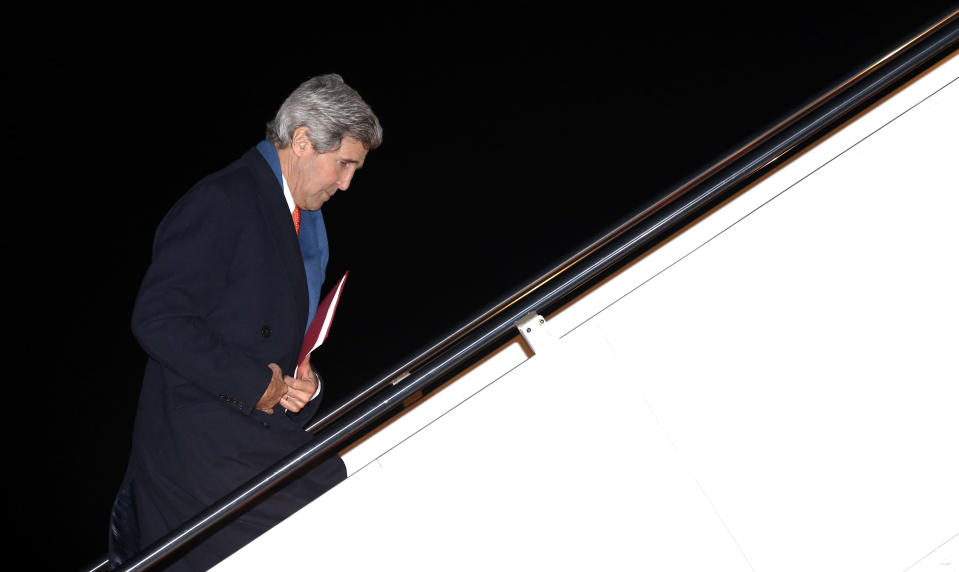Kerry heads to Ukraine as West ponders sanctions
WASHINGTON (AP) — Secretary of State John Kerry on Tuesday will be reinforcing Washington's support for the new government in Kiev, as the U.S. and its top allies grapple with whether to slap Moscow with sanctions for its military takeover of Ukraine's strategic Crimea region.
Kerry left Monday for the Ukrainian capital. The European Union's foreign ministers, meantime, issued a Thursday deadline for Russia President Vladimir Putin to pull back his troops or face a rejection of visa liberalization and economic cooperation negotiations long in the works.
Western leaders point to huge hits that Russia's natural gas, uranium and coal industries would take if sanctions cut off exports to the EU, its largest customer.
Putin on Tuesday rejected the threat of sanctions, saying they will backfire against the West.
The U.S. and its allies acknowledge that few options exist beyond economic and diplomatic penalties, and critics said Obama administration efforts are too little, and too late, after years of trying to foster friendlier relations with Russia.
President Barack Obama on Monday described the Russian advance as a violation of international law. He called on Congress to approve an aid package for the new Ukrainian government and repeated earlier threats that the U.S. will take steps to hobble Russia's economy and isolate it diplomatically if Putin does not back down.
"The strong condemnation that has proceeded from countries around the world indicates the degree to which Russia is on the wrong side of history," Obama said.
The White House said Obama met for more than two hours Monday night with the National Security Council, including Secretary of State John Kerry and Defense Secretary Chuck Hagel, to discuss what steps the United States can take with international partners to further isolate Russia and persuade it to de-escalate the situation.
The Pentagon announced late Monday it was suspending military-to-military engagements with Russia, including exercises, bilateral meetings, port visits and conferences.
Some Republicans in Congress were considering a possible package of "debilitating economic sanctions" to get Putin's attention. House Foreign Affairs Committee Chairman Ed Royce said the U.S. and Europe should act collectively to threaten the Russian stock market, economy and ruble if Russia doesn't withdraw from Crimea.
"We can't just keep talking," Royce said. "We need to do something."
Speaking at a U.N. session in Geneva, Russian Foreign Minister Sergey Lavrov attempted to deflect blame back on the West. He defended the deployment of Russian troops in Ukraine as a necessary protection for his country's citizens living there.
"Those who are trying to interpret the situation as a sort of aggression and threatening us with sanctions and boycotts, these are the same partners who have been consistently and vigorously encouraging the political powers close to them to declare ultimatums and renounce dialogue," Lavrov said.
"This is a question of defending our citizens and compatriots, ensuring human rights, especially the right to life," he said.
Lavrov said Ukraine should return to a Feb. 21 agreement that sought to end months of unrest in Kiev by addressing an array of issues at the heart of the dispute between protesters and the government of then-Ukrainian President Viktor Yanukovych. However, the agreement did not address the grievances that caused the protests in the first place, and the pro-Russian Yanukovych fled Kiev for protective sanctuary near Moscow within days of signing it.
U.S. officials say the Feb. 21 agreement could form the "basis" for a political resolution to the crisis, but not in its present form. State Department spokeswoman Jen Psaki said it would have to be significantly altered in order to be useful, given major changes since it was signed.
___
Associated Press reporters Nedra Pickler, Josh Lederman, Deb Riechmann and Matthew Lee contributed to this report.
___
Follow Lara Jakes on Twitter: https://twitter.com/larajakesAP




